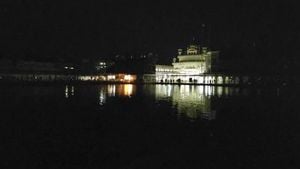In a surprising turn of events during the presidential candidate debate aired by Polsat on May 5, 2025, Wojciech Hadaj, a former speaker for Legia Warszawa, represented Krzysztof Stanowski. This unexpected choice left many viewers astonished, particularly due to Hadaj's background in sports commentary rather than politics.
The debate, which was held at 8 PM, was moderated by Piotr Witwicki, the head of information at Polsat News. He noted that not all candidates' representatives were invited to participate. Specifically, the campaign staff of Maciej Maciak, who leads the Ruch Dobrobytu i Pokoju movement, was notably absent. Witwicki explained, "If someone wants to hear from Maciej Maciak's staff, they can tune in to Russia Today," highlighting the controversial nature of Maciak's political views.
During the debate, Hadaj made headlines with his remark, "You must have known these questions," suggesting that there was prior knowledge of the debate questions among the candidates. This statement elicited laughter in the studio, showcasing the light-hearted yet tense atmosphere of the event.
The upcoming presidential elections in Poland are set for May 18, 2025, with a potential second round scheduled for June 1, 2025. The debate featured representatives from various political campaigns, including Monika Rosa for Rafał Trzaskowski, Tobiasz Bocheński for Karol Nawrocki, and others. Each representative aimed to articulate their candidate's vision and policies ahead of the critical election.
Hadaj's participation sparked significant discussion on social media, with many users expressing surprise at his role in the political debate. His background as a sports commentator raised questions about the suitability of such figures in political discourse. Nevertheless, his humorous approach seemed to resonate with some viewers, who appreciated the lighter moments amid serious discussions.
In stark contrast, Maciej Maciak's absence from the debate was noted as he has been a polarizing figure due to his pro-Russian sentiments. During a previous debate organized by "Super Express" on April 28, 2025, Maciak openly admitted to admiring Russian President Vladimir Putin, a statement that has drawn sharp criticism and concern from various political circles in Poland. His views align with a broader narrative that raises alarms about potential influences on Polish politics from foreign entities.
The debate's structure allowed candidates to present their platforms without direct confrontation, which is typical in traditional debates. This format aimed to foster a more constructive dialogue about the issues facing Poland, including economic recovery, social justice, and international relations.
As the first round of elections approaches, the political climate in Poland is increasingly charged. Issues such as the economy, healthcare, and national security are at the forefront of voters' minds. Candidates are vying not only for votes but also for public trust amid a backdrop of skepticism about political integrity.
Hadaj's performance, while humorous, underscores the shifting landscape of political representation in Poland, where figures from various backgrounds are stepping into roles traditionally held by seasoned politicians. This trend reflects a broader global phenomenon where outsiders are increasingly gaining traction in political arenas, often appealing to voters seeking change.
As the campaign heats up, the role of social media in shaping public perception cannot be underestimated. Candidates are using platforms like Twitter and Facebook to engage with voters directly, bypassing traditional media filters. This strategy has proven effective in mobilizing support, particularly among younger demographics who are more inclined to consume news online.
With just weeks to go before the elections, candidates are ramping up their outreach efforts. Hadaj's humorous remarks may have garnered him some attention, but the real test will be whether such tactics translate into votes. The upcoming weeks will be critical as candidates refine their messages and respond to voter concerns.
In summary, the Polsat debate on May 5, 2025, provided a platform for candidates to showcase their visions for Poland's future. While Wojciech Hadaj's unexpected representation of Krzysztof Stanowski brought a unique flair to the proceedings, the absence of Maciej Maciak highlighted the contentious nature of the current political landscape. As the first round of elections approaches, the stakes are high, and every statement made during these debates could prove pivotal in influencing voter sentiment.




